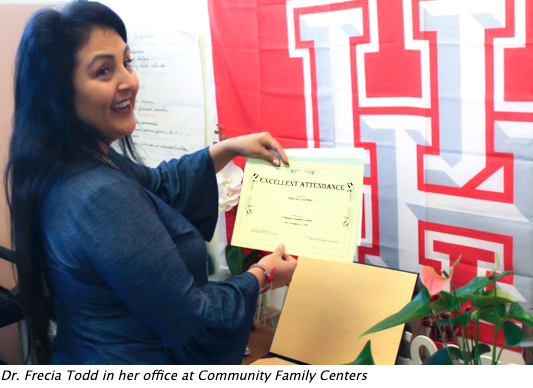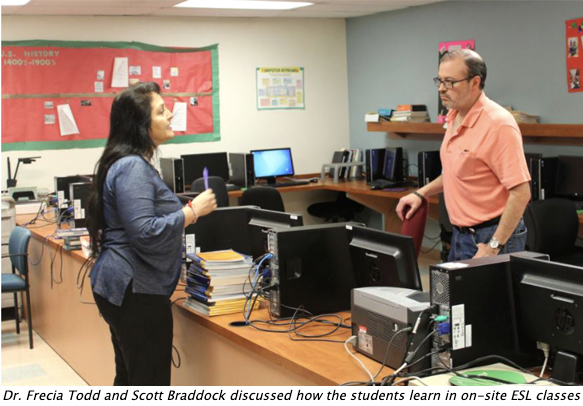 A key challenge for companies and their employees in Houston’s historic East End centers on tearing down language barriers. One of the ways that’s now being accomplished is taking English as a Second Language (ESL) classes to the students rather than making the students come to the class.
A key challenge for companies and their employees in Houston’s historic East End centers on tearing down language barriers. One of the ways that’s now being accomplished is taking English as a Second Language (ESL) classes to the students rather than making the students come to the class.
For the past two years, Community Family Centers has offered these on-site ESL classes for workers at a variety of businesses including two hotels, an industrial metal recycler, a funeral home, and the nonprofit recently formed a partnership with an oil field services company called General Plastics and Composites. When contextualized to a workplace setting, these English language class services are referred to as “English at Work.”
GP&C’s leadership wanted to focus on improving the English skills of their workers for a variety of reasons so the partnership with CFC made all the sense in the world, said Paul Landa, Program Manager of Adult Education at CFC.
At Community Family Centers, their mission is straightforward: To equip families with the tools they need to become self-sufficient members of the community. The group started out years ago quite humbly as a group of community volunteers working out of a church basement. Today, CFC has grown into an agency with a $2.7 million annual operating budget, nearly 50 staff members and roughly 250 volunteers serving more than 44,000 clients every year.
The way they serve those clients is always evolving and the on-site ESL classes are a perfect example.
In terms of scheduling, the on-site classes make a huge difference for the workers and participating companies, Landa said. The actual CFC facility in the East End has an 8 to 5 schedule. “That doesn’t accommodate all,” Landa said. They now offer these classes on job sites so that “we can adjust and make it more tailored to their schedule.”
By doing it this way – having the instructor go to the students instead of the other way around – the classes can be offered during four shifts throughout the day and night, Landa said.
Landa said that when the students are learning a new language, they can be hesitant to try to incorporate it into their everyday interactions for fear of making mistakes. But “it’s okay to make mistakes,” he said. “Through those mistakes, we learn.”
The shift to on-site education, where students are literally being paid to learn English, has improved their confidence in immeasurable ways. “Employees almost immediately became more confident in speaking English at the job,” Landa said.
 Dr. Frecia Todd, Ed.D., loves teaching the students in these classes in large part because she began her education at Community Family Centers as a student in 1999 when it was known as Chicano Family Centers.
Dr. Frecia Todd, Ed.D., loves teaching the students in these classes in large part because she began her education at Community Family Centers as a student in 1999 when it was known as Chicano Family Centers.
An immigrant from El Salvador, Todd made her way up through CFC’s programs, then moved on to the Houston Community College System and eventually earned her PhD from the University of Houston. Todd’s passion for education and helping these students with similar life experiences to her own is what brought her back to Community Family Centers.
Dr. Todd wants to instill that in her students.
“You just want to learn what is truth. That way you can help your peers,” Todd said. “You feel thirsty for more and you don’t want to stop there,” Todd said. “That’s how I started linking the nonprofit and the school and found my passion.”
When Todd was first living in the United States, her mother was quite ill and “I just had to take care of my mom.” That experience helps her relate to what her students are going through as they build their skillset while working to care for their own families.
“I know what happens when you go through that. I know the challenges. I know the feelings of success,” Todd said.
Leading by example motivates the students in a way that can’t be accomplished simply by imparting knowledge, Todd said. When the essential knowledge is paired with wisdom, the students are naturally more engaged because they can see and look up to someone who made their way through similar circumstances.
But finding that kind of success is a long hard road and does not happen overnight, Todd stressed.
“You can’t be born and start running,” Todd said. “You have to walk first before you can run. Then you just never stop.”


